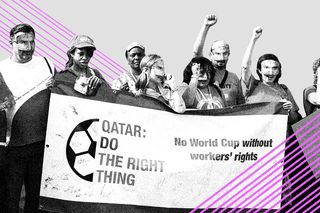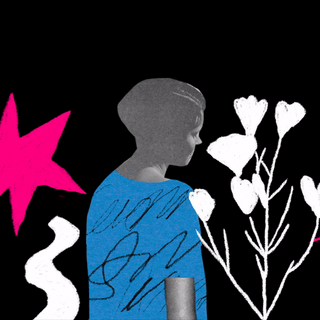
Rights Groups Boycott FIFA in Qatar. Why Are They Being Ignored?
The inherent masculinity of sport remains unchallenged — leading to “soft” concerns pertaining to rights and ethics going unheard.

The FIFA World Cup is right around the corner. The 32-team quadrennial event is all set to kick off this Sunday at Qatar’s Al Bayt stadium. But even as hosts Qatar ready themselves to showcase their world-class football stadiums, human rights groups are increasingly calling for a boycott of the tournament.
Over the last decade, as Qatar prepared itself to host the first-ever FIFA World Cup in the Arab peninsula, Humans Rights groups pointed out the several violations the Gulf state was committing. The monarchical state was accused of employing slave labor from South Asia to build the infrastructure required for the tournament, killing at least 6,500 migrant workers from India, Pakistan, Nepal, Sri Lanka, and Bangladesh in the process. As per an Amnesty International estimate, at least 1,00,000 migrant laborers were exploited and abused by the Qatar administration since the state was granted the right to host the World Cup in 2010. Notably, as The Guardian points out, FIFA didn’t include any human rights and labor protection clauses in the agreement when they awarded Qatar the right to host the tournament.
The impunity and ease with which both Qatar and FIFA have escaped accountability is perhaps linked to the nature of football — and sports — itself and may be explained by understanding the inherent masculinity in the way we perceive sports in the present day. Competitive sports environments and our expectations of sports professionals reflect a hypermasculine tendency within sports that imagines it as entertainment for — and by — men.
Beyond the severe labor exploitation, the gulf state has also faced some vocal criticism against its conservative laws on personal liberty. Homosexuality is illegal in Qatar, with individuals in the country facing up to five years in prison for it. As per a report by The Guardian, the state administration recently began employing gay individuals in the country to work as agents to report other homosexual people to the state, in exchange for their own freedom. The run-up to the world cup saw some footballers stating that they would sport a rainbow armband while playing their matches to protest against this criminalization of same-sex relationships in the nation.
On the one hand, Qatar has a dismal record when it comes to recognizing queer rights. State representatives have repeatedly maintained that they view homosexuality as a sin or a “mental disease.” On the other, the tournament in Qatar is also a potential threat to female football fans. “In Qatar, women who face sexual violence — whether by their partners, colleagues, friends, or strangers — can find themselves prosecuted for extra-marital sex,” The Athletic quotes Rohanna Begum of Human Rights Watch as saying, highlighting how the laws of the nation are pitted against women. Further, the law prescribes flogging in such cases if the woman in question is Muslim. May Romanos, a researcher at Amnesty International, tells The Athletic, “You go to the police, and instead of being the victim, you become the accused.”
These are some of the reasons why human rights groups have vocally asked people for a boycott of the World Cup. Organizations have also demanded more accountability and responsible behavior from FIFA and Qatar over these violations. Amnesty International, for instance, demanded that the Qatar government pledge a sum of $440 million — same as the winner’s prize in the tournament — as compensation to the families of the people who have lost their lives while building Qatar’s world cup infrastructure. However, despite multiple calls for accountability and transparency, both the Qatar government and FIFA have either remained silent or denied all the allegations of human rights violations.
Related on The Swaddle:
Hate Against Cricketer Arshdeep Singh Shows the Pitfalls of Sports Nationalism
On the state of women’s rights in the state, for instance, FIFA has expressed that it is satisfied with the rights women have in the nation, while Qatar has maintained that its laws are dedicated to protecting women. On queer rights, the country has allowed entry to people of every sexuality and gender during the duration of the world cup while at the same time maintaining in public its stance on homosexuality being a sin. It has asked that visiting gay fans respect the laws of the land. In some instances, Qatar has gone so far as to say that all the calls for a boycott are stemming purely from racism and that all allegations against the state are baseless.
The primary emotion that marks both male upbringing and competitive sports arenas is high, testosterone-fuelled, tension. Society is constantly fixated on the sports team — and men — winning against the opponent and emerging on top. Sportspersons are expected to have the best possible physicality, feel no pain, and express no emotions or interests outside their profession. When sportspersons take out time from their schedules to be with their family — like star Indian batsman Virat Kohli did — they are criticized for not prioritizing their profession. Often, war metaphors are employed for simple matches, associating a great deal of prestige and power on sporting bouts. As this piece in the Washington Post notes, “The world of sports (is) often a cartoonish illustration of stereotypical masculinity, fosters an unending cycle of virulence.”
But the cartoonish illustration of stereotypical masculinity has fallouts in the real world. The inherent masculinity in the sports arena often spills onto sexual misconduct by players and teams outside of the sports ground. It fosters a locker room attitude among sportspersons and support staff. And as it is normalized across the board, it also shapes how sports administration is carried out. Hence, women’s sports remain bereft of adequate funding and attention, and issues of women and queer rights are easy to brush aside in an international tournament. After all, the primary perception of football is hypermasculine; women — and non-masculine, non-cisgender men — simply do not feature in this image.
As long as the inherent masculinity of sport remains unchallenged, workers’, women’s, and queer persons’ rights will remain a “soft” issue for sports federations. Qatar 2022, then, is not an exception — just the loudest example of the rule.
Amlan Sarkar is a staff writer at TheSwaddle. He writes about the intersection between pop culture and politics. You can reach him on Instagram @amlansarkr.
Related


How Asexuality Is the Quiet Queer Revolution
